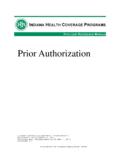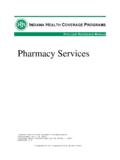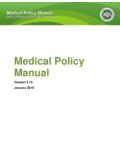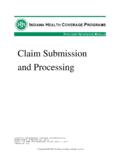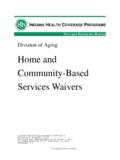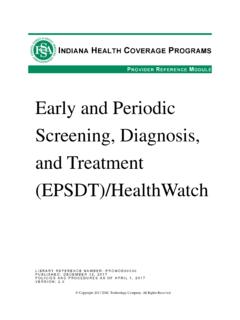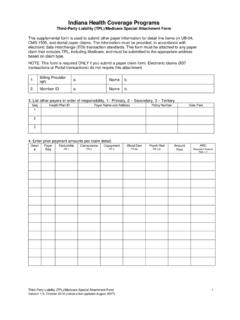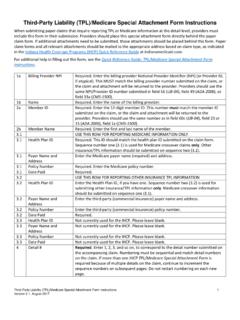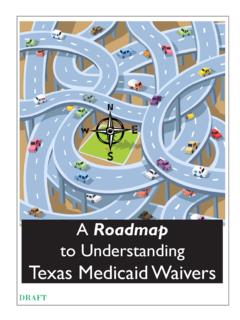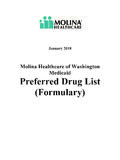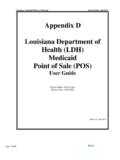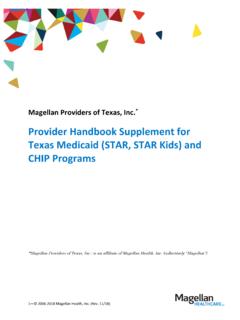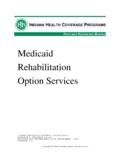Transcription of IHCP bulletin - Indiana Medicaid Provider Home
1 IHCP bulletin Indiana HEALTH COVERAGE PROGRAMS BT201801 JANUARY 4, 2018 Page 1 of 4 IHCP enhances coverage for substance use treatment As part of a 1115 demonstration waiver (authorized under Section 1115 of the Social Security Act), the Indiana Health Coverage Programs (IHCP) will expand its coverage of substance use treatment. The first of these changes will be implemented in early 2018 to coincide with the expected approval of the demonstration waiver through the Centers for Medicare & Medicaid Services (CMS). These coverage changes expansion of inpatient coverage, coverage of residential treatment, and establishment of a new Provider type and specialty for residential treatment will apply to all programs, including Healthy Indiana Plan (HIP), Hoosier Care Connect, Hoosier Healthwise, and Traditional Medicaid .
2 The following individuals are not eligible for the coverage: Individuals eligible for emergency services only Individuals eligible for the Family Planning Eligibility Program Individuals who qualify as Qualified Medicare Beneficiaries-Only and Specified Low-Income Medicare Beneficiaries-Only Expanded inpatient substance use treatment Effective February 1, 2018, the IHCP will expand coverage for inpatient stays for opioid use disorder (OUD) and other substance use disorder (SUD) treatment to members 21 through 64 years of age in facilities that qualify as institutions for mental disease (IMD)
3 , according to Code of Federal Regulations 42 CFR Providers enrolled as psychiatric hospitals ( Provider type 01 and Provider specialty 011) that have 17 or more beds are currently the only providers recognized by the IHCP as qualified IMDs. The CMS is allowing inpatient stays in IMDs for members in the 21 through 64 age group to be authorized for up to 15 days in a calendar month. Prior authorization (PA) is required for all inpatient stays. Admission criteria for inpatient stays for OUD or other SUD treatment in all settings, including IMDs, will be based on the American Society of Addiction Medicine (ASAM) Patient Placement Criteria, Level 4 (Medically Managed Intensive Inpatient Services).
4 Providers are required to include all appropriate documentation demonstrating medical necessity for inpatient treatment with the PA request. Inpatient stays for OUD and other SUD treatment will continue to be reimbursed on diagnosis-related group (DRG) payment methodology. IHCP bulletin BT201801 JANUARY 4, 2018 Coverage and reimbursement information apply to inpatient substance use treatment delivered under both the fee-for-service (FFS) and the managed care delivery systems. PA requirements apply to services delivered FFS only. Questions about FFS PA should be directed to Cooperative Managed Care Services (CMCS) at 1-800-269-5720.
5 Individual managed care entities (MCEs) establish PA requirements for these services. Questions about managed care PA should be directed to the MCE with which the member is enrolled. Residential substance use treatment Effective March 1, 2018, the IHCP will provide coverage for short-term low-intensity and high-intensity residential treatment for OUD and other SUD treatment in settings of all sizes, including facilities that qualify as IMDs. The CMS is allowing short-term residential stays to be authorized with a statewide average length of 30 calendar days, based on medical necessity.
6 PA is required for all residential stays. Admission criteria for residential stays for OUD or other SUD treatment will be based on the ASAM Patient Placement Criteria Level (Clinically Managed Low-Intensity Residential Services) and Level (Clinically Managed High-Intensity Residential Services). Providers are required to include all appropriate documentation demonstrating medical necessity for residential treatment with PA requests. Providers will be reimbursed for residential stays for substance use treatment on a per diem basis. Specific billing guidance for low-intensity and high-intensity residential treatment services is provided in Table 1 and Table 2, respectively.
7 Table 1 Low-intensity residential treatment (ASAM Level ) billing guidance Table 2 High-intensity residential treatment (ASAM Level *) billing guidance *ASAM is considered medium-intensity residential treatment for adolescents. Services included in per diem Procedure code Description Individual therapy Group therapy Medication training and support Case management Drug testing Peer recovery supports H2034 Alcohol and/or drug abuse half-way house service, per diem Services included in per diem Procedure code Description Individual therapy Group therapy Medication training and support Case management Drug testing Peer recovery supports Skills training and development H0010 Alcohol and/or drug services.
8 Acute detoxification (residential addiction program inpatient) Page 2 of 4 IHCP bulletin BT201801 JANUARY 4, 2018 Additional billing guidance for both levels of residential substance use treatment include: Reimbursement for the codes in Tables 1 and 2 is limited to one unit per member per Provider per day. Providers are required to include the following modifiers when billing services: U1 Member is an adult (age 19 years and older) U2 Member is a child (age 0 through 18 years old) Providers should bill using a professional claim. Services that are reimbursable outside the daily per diem rate include: Physician visits Physician-administered medications Residential substance use disorder treatment facilities are not eligible for hospital assessment fee (HAF) adjustments.
9 The IHCP ultimately intends to establish a requirement that a multidimensional assessment tool be used to support all requests for inpatient and residential addiction treatment services. The IHCP expects to implement this requirement sometime later in 2018 and will specify that the assessment tool include the following dimensions: Acute intoxication and/or withdrawal potential Biomedical conditions and complications Emotional, behavioral, or cognitive conditions and complications Readiness to change Relapse, continued use, or continued problem potential Recovery/living environment Watch future IHCP notifications for information about this multidimensional assessment tool requirement.
10 Coverage for residential substance use treatment will be reflected in updates to the Professional Fee Schedule at Reimbursement, PA, and billing information apply to services delivered under the FFS delivery system. Questions about FFS PA should be directed to CMCS at 1-800-269-5720. Individual MCEs establish and publish reimbursement, PA, and billing information within the managed care delivery system. Questions about managed care billing and PA should be directed to the MCE with which the member is enrolled. New Provider specialty for SUD residential addiction treatment facilities In an effort to raise the standards of care for addiction treatment providers in Indiana , the Office of Medicaid Policy and Planning (OMPP) is partnering with the Division of Mental Health and Addiction (DMHA) to develop an ASAM level-of-care designation process, beginning with residential addiction treatment facilities.
